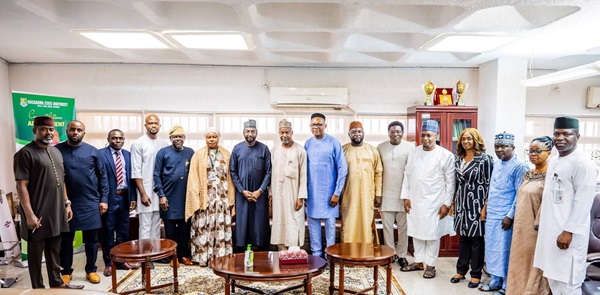
The National Information Technology Development Agency (NITDA) and the National Universities Commission (NUC) have reaffirmed their commitment to implementing the digital literacy and skills curriculum across Nigerian universities.
This was announced during a visit by NITDA’s director-general, Mallam Kashifu Abdullahi and his management team to the NUC, where they engaged with the newly appointed executive secretary, Prof. Abdullahi Ribadu.
The meeting aimed to reignite the implementation of this ambitious initiative, initially agreed upon during a visit in December 2024, and to reinforce the commitment of both organisations to integrating digital literacy into Nigeria’s higher education system.
During the discussions, Abdullahi emphasised that human capital development is central to national progress, stressing the need to reform Nigeria’s education system by incorporating digital skills and emerging technologies such as artificial intelligence (AI), blockchain, Internet of Things (IoT), Cloud computing and cybersecurity into university curricula.
“With the rapid advancement of technology, digital skills are no longer optional but a necessity for success in today’s workforce,” Abdullahi stated.
“This collaboration is a strategic move to equip Nigerian students with the competencies needed to thrive in a technology-driven world. It will enhance job creation, entrepreneurship and overall economic resilience.”
He further emphasised the need to revise school curricula to ensure that graduates are not only degree holders but also skilled professionals equipped for the digital age.
“Education reform is critical, and implementing this curriculum nationwide will be a game-changer for Nigeria’s development,” he added.
This initiative aligns with NITDA’s Strategic Roadmap and Action Plan (SRAP 2.0) and underscores the vital role of digital literacy in preparing Nigeria’s youth for the future.
Abdullahi also highlighted that the initiative aligns with President Bola Ahmed Tinubu’s administration priorities, particularly the reform of the economy to drive inclusive growth, industrialization, digitisation, creative arts, manufacturing and innovation.
He stressed that empowering young Nigerians with digital knowledge would drive economic transformation by creating an innovative, entrepreneurial workforce ready to meet the challenges of the modern economy.
In his response, Ribadu reaffirmed NUC’s commitment to the full implementation of the digital literacy and skills curriculum, emphasising the commission’s dedication to fostering innovation and digital transformation within Nigeria’s higher education sector.
He commended NITDA for its leadership in advancing Nigeria’s digital agenda and assured that the NUC would work closely with the agency to ensure seamless integration of digital literacy into university curricula nationwide.
Ribadu acknowledged that digital education is central to Nigeria’s vision of becoming a leading knowledge-based economy and pledged to facilitate necessary policy adjustments to support this goal.
The collaboration between NITDA and NUC will involve a structured implementation plan, capacity-building programmes for educators and deployment of digital infrastructure to support smooth adoption.
Universities will also be encouraged to incorporate emerging technologies into their curricula to ensure students acquire globally relevant digital skills.
Beyond curriculum reform, this initiative is expected to bridge the digital divide, ensuring that students from all backgrounds, including those in rural and underserved areas, have access to quality digital education.
As technology continues to reshape industries and societies worldwide, Nigeria’s investment in digital literacy will serve as a catalyst for long-term socio-economic transformation.
With strong commitment from both NITDA and NUC, the implementation of the Digital Literacy and Skills Curriculum will usher in a new era in Nigeria’s education sector, fostering a generation of tech-savvy graduates well-prepared to drive the nation’s digital economy forward.


